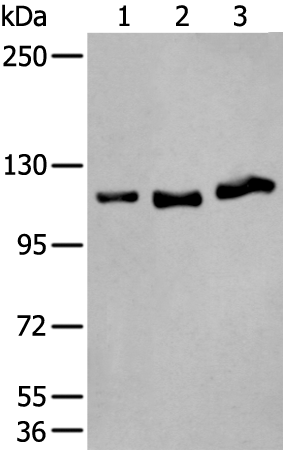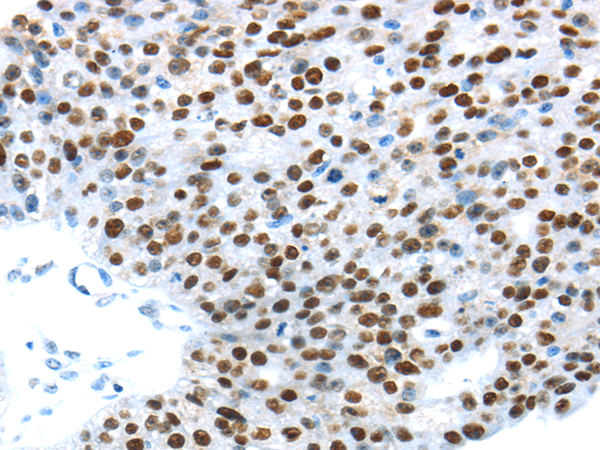

| WB | 1/500-1/1000 | Human,Mouse,Rat |
| IF | 咨询技术 | Human,Mouse,Rat |
| IHC | 咨询技术 | Human,Mouse,Rat |
| ICC | 1/50-1/200 | Human,Mouse,Rat |
| FCM | 咨询技术 | Human,Mouse,Rat |
| Elisa | 咨询技术 | Human,Mouse,Rat |
| Aliases | A1S9; A1ST; GXP1; UBE1; A1S9T; AMCX1; POC20; SMAX2; UBA1A; UBE1X; CFAP124 |
| WB Predicted band size | 118 kDa |
| Host/Isotype | Rabbit IgG |
| Antibody Type | Primary antibody |
| Storage | Store at 4°C short term. Aliquot and store at -20°C long term. Avoid freeze/thaw cycles. |
| Species Reactivity | Human, Mouse, Rat |
| Immunogen | Synthetic peptide of human UBA1 |
| Formulation | Purified antibody in PBS with 0.05% sodium azide and 50% glycerol. |
+ +
以下是关于CrkL抗体的3篇参考文献及其摘要概括:
---
1. **文献名称**: *"Tyrosine phosphorylation of CrkL in Philadelphia chromosome-positive leukemia"*
**作者**: Oda, T., Heaney, C., Hagopian, J.R., Okuda, K., Griffin, J.D., Druker, B.J. (1994)
**摘要**: 该研究通过使用特异性CrkL抗体,揭示了在费城染色体阳性(Ph+)白血病细胞(如CML)中,BCR-ABL融合蛋白通过持续磷酸化CrkL的酪氨酸残基,激活下游信号通路,促进细胞异常增殖。抗体在免疫沉淀和Western blot中验证了CrkL与BCR-ABL的相互作用。
2. **文献名称**: *"CrkL is constitutively tyrosine-phosphorylated in chronic myelogenous leukemia cells and is involved in cell adhesion"*
**作者**: Senechal, K., Heaney, C., Druker, B., Sawyers, C.L. (1996)
**摘要**: 研究利用CrkL特异性抗体检测发现,慢性粒细胞白血病(CML)患者的原始细胞中CrkL呈持续酪氨酸磷酸化状态。这种异常磷酸化与细胞黏附功能失调相关,提示CrkL抗体在监测CML患者治疗反应中的潜在应用。
3. **文献名称**: *"CrkL expression in solid tumors: A biomarker for Src kinase activity and therapeutic target"*
**作者**: Nath, D., Li, X., Mondal, S., Pendergast, A.M. (2003)
**摘要**: 通过免疫组化(使用抗CrkL抗体)分析多种实体瘤组织,发现CrkL的高表达与Src激酶活性升高及肿瘤侵袭性相关。研究提出CrkL抗体可作为诊断工具,并提示靶向CrkL信号通路可能抑制肿瘤转移。
---
以上文献聚焦于CrkL抗体在白血病及实体瘤研究中的应用,涵盖机制探索、诊断标志物及治疗靶点等方向。如需扩展或调整领域,可进一步补充!
CrkL (CT10 regulator of kinase-like) is an adaptor protein belonging to the Crk family, which includes CrkI and CrkII. It plays a critical role in intracellular signaling by mediating protein-protein interactions through its Src homology 2 (SH2) and Src homology 3 (SH3) domains. CrkL facilitates signal transduction downstream of tyrosine kinases, linking activated receptors to effector molecules involved in cell proliferation, migration, adhesion, and immune responses. It is notably involved in pathways regulated by cytokines, growth factors (e.g., EGF, PDGF), and oncogenic proteins like BCR-ABL in chronic myeloid leukemia (CML).
CrkL antibodies are essential tools for detecting and studying this protein in research contexts. They are widely used in techniques such as Western blotting, immunoprecipitation, and immunofluorescence to analyze CrkL expression, phosphorylation status (e.g., Tyr207 phosphorylation by Abl kinase), and interaction partners. Dysregulation of CrkL has been implicated in cancers, immune disorders, and pathological fibrosis, making its detection crucial for understanding disease mechanisms. Commercial CrkL antibodies are typically validated for specificity against conserved regions, though variations may exist depending on epitope targets. Research utilizing these antibodies has advanced insights into CrkL's role in oncogenesis, T-cell receptor signaling, and its potential as a therapeutic target.
×